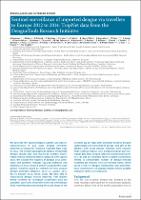| dc.contributor | Vall d'Hebron Barcelona Hospital Campus |
| dc.contributor.author | Neumayr, Andreas |
| dc.contributor.author | Muñoz, Jose |
| dc.contributor.author | Bottieau, Emmanuel |
| dc.contributor.author | Cramer, Jakob |
| dc.contributor.author | Calleri, Guido |
| dc.contributor.author | Serre Delcor, Nuria |
| dc.contributor.author | Sulleiro Igual, Elena |
| dc.contributor.author | Schunk, Mirjam |
| dc.date.accessioned | 2021-04-28T10:43:21Z |
| dc.date.available | 2021-04-28T10:43:21Z |
| dc.date.issued | 2017-01-05 |
| dc.identifier.citation | Neumayr A, Muñoz J, Schunk M, Bottieau E, Cramer J, Calleri G, et al. Sentinel surveillance of imported dengue via travellers to Europe 2012 to 2014: Tropnet data from the denguetools research initiative. Eurosurveillance. 2017 Jan 5;22(1):30433. |
| dc.identifier.issn | 1025-496X |
| dc.identifier.uri | https://hdl.handle.net/11351/5920 |
| dc.description | Dengue; Vigilancia; Importación |
| dc.language.iso | eng |
| dc.publisher | European Centre for Disease Prevention and Control |
| dc.relation.ispartofseries | Eurosurveillance;22(1) |
| dc.rights | Attribution 4.0 International |
| dc.rights.uri | http://creativecommons.org/licenses/by/4.0/ |
| dc.source | Scientia |
| dc.subject | Dengue - Transmissió |
| dc.subject | Salut pública |
| dc.subject.mesh | Dengue |
| dc.subject.mesh | /transmission |
| dc.subject.mesh | Sentinel Surveillance |
| dc.title | Sentinel surveillance of imported dengue via travellers to Europe 2012 to 2014: TropNet data from the DengueTools Research Initiative |
| dc.type | info:eu-repo/semantics/article |
| dc.identifier.doi | 10.2807/1560-7917.ES.2017.22.1.30433 |
| dc.subject.decs | dengue |
| dc.subject.decs | /transmisión |
| dc.subject.decs | vigilancia centinela |
| dc.relation.publishversion | https://www.eurosurveillance.org/content/10.2807/1560-7917.ES.2017.22.1.30433 |
| dc.type.version | info:eu-repo/semantics/publishedVersion |
| dc.audience | Professionals |
| dc.contributor.organismes | Institut Català de la Salut |
| dc.contributor.authoraffiliation | [Neumayr A] Department of Medicine and Diagnostics, Swiss Tropical and Public Health Institute, Basel, Switzerland. University of Basel, Switzerland. [Muñoz J] ISGlobal, Barcelona Centre for International Health Research (CRESIB), Hospital Clínic-Universitat de Barcelona, Barcelona, Spain. [Schunk M] Division of Infectious Diseases and Tropical Medicine, Medical Centre of the Ludwig-Maximilian-University (LMU), Munich, Germany. [Bottieau E] Department of Clinical Sciences, Institute of Tropical Medicine, Antwerp, Belgium. [Cramer J] Department of Internal Medicine I, Section Tropical Medicine, University Medical Center Hamburg-Eppendorf, Hamburg, Germany; Department of Clinical Research, Bernhard Nocht Institute for Tropical Medicine, Hamburg, Germany. [Calleri G] Travel Medicine Unit, Department of Infectious Diseases, Amedeo di Savoia Hospital- ASLTO2, Torino, Italy. [Serre-Delcor N] Centre de Salut Internacional i Malalties Transmissibles Drassanes-Vall d'Hebron, Barcelona, Spain. Vall d’Hebron Hospital Universitari, Barcelona, Spain. PROSICS, Institut Català de la Salut, Barcelona, Spain. [Sulleiro E] Servei de Microbiologia, Vall d’Hebron Hospital Universitari, Barcelona, Spain. PROSICS Barcelona. Universitat Autònoma de Barcelona, Bellaterra, Spain |
| dc.identifier.pmid | 28080959 |
| dc.identifier.wos | 000392156300004 |
| dc.rights.accessrights | info:eu-repo/semantics/openAccess |

 Área privada
Área privada Contacto
Contacto







